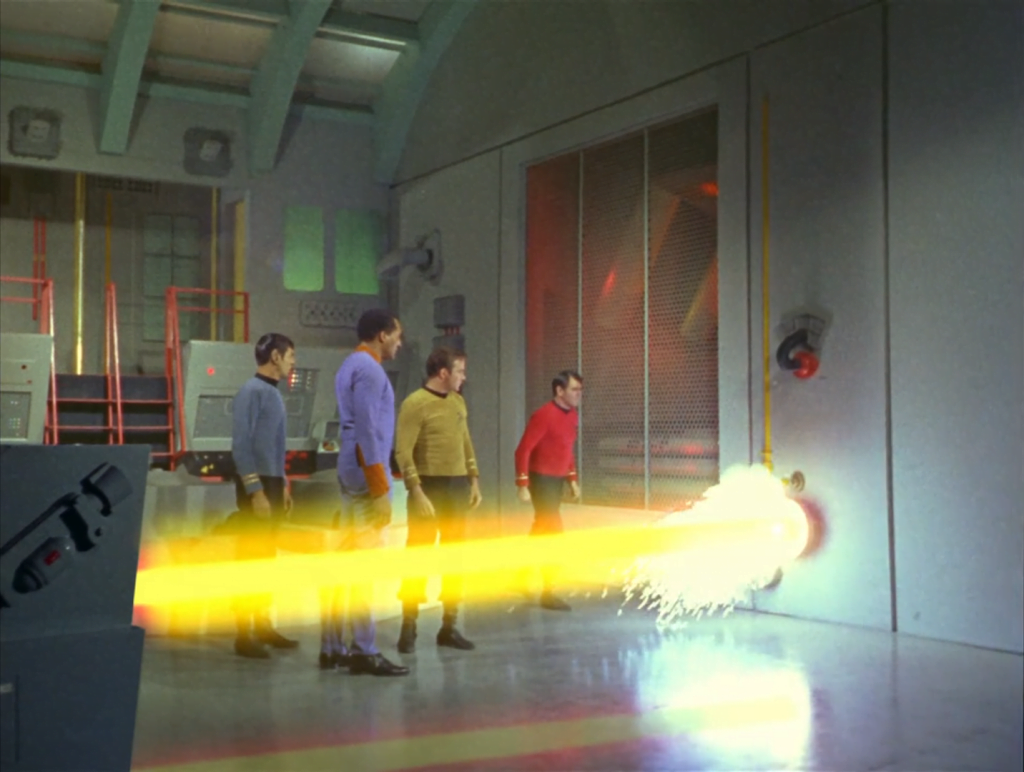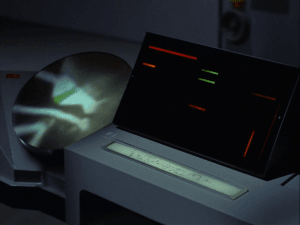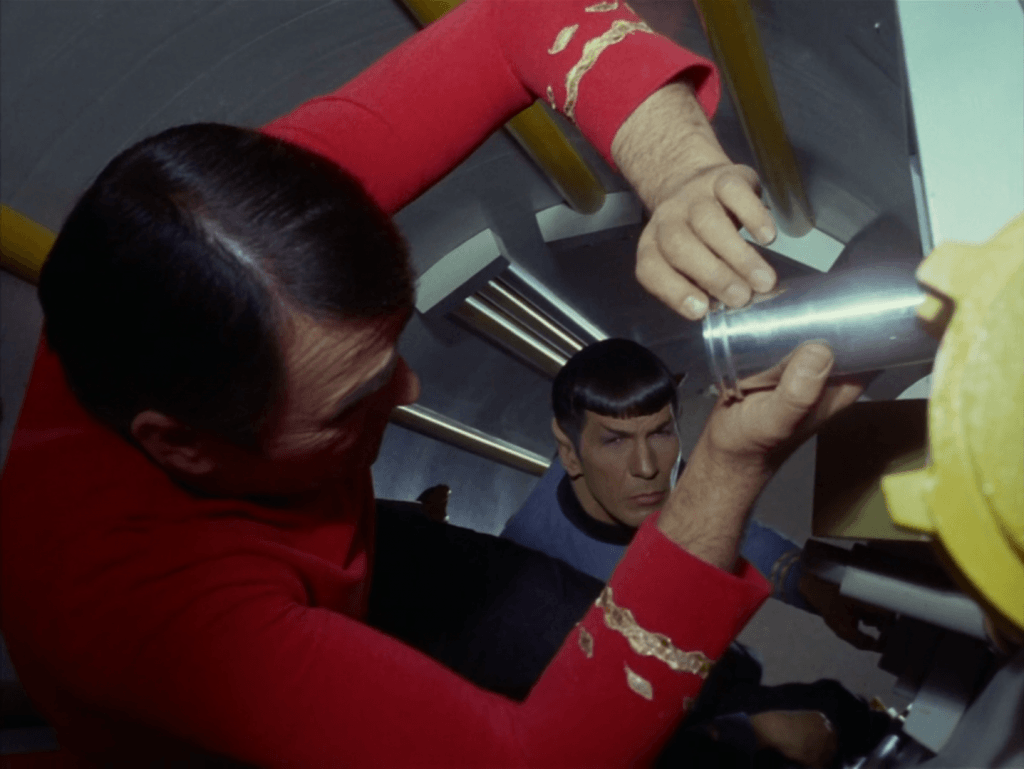
Daystrom continues to rationalize M-5’s actions and pleads for a chance to reason with it. As one of Scotty’s engineers moves to disconnect the computer from the ship’s batteries, a beam of energy lances out, vaporizing the man. Later, Spock briefs the remaining crew. M-5 is drawing (effectively unlimited) power from the warp engines and has assumed full control of all ship functions. With only an hour to go before the scheduled war games, they need to regain control as fast as possible. To that end, they devise a plan to disrupt the M-5 by focusing on a specific relay between the computer and the bridge.
As Spock and Scotty get to work, McCoy confronts Daystrom, who continues to defend the M-5. Despite these “growing pains,” Daystrom remains blinded by the potential of the M-5, envisioning a world in which “men no longer need die in space or on some alien world.” Later, McCoy speaks with Kirk. The doctor has reviewed Daystrom’s biography, which does little more than confirm that the man’s a genius, having revolutionized computer science by the time he was twenty-four. This leads the two to start filling in the blanks. After all, where do you go from the top? Especially when you reach the top at such a such a young age. Kirk reminds the doctor that “genius doesn’t work on an assembly line,” but that doesn’t change the fact that Daystrom effectively peaked twenty-five years ago. Between this and the M-5’s erratic behavior, the computer begins to look less like a breakthrough and more like an act of desperation. McCoy also points out that Daystrom treats the M-5 less like a machine and more like his own child.
Their work complete, Spock and Scotty are ready to retake control of the ship. Daystrom desperately tries to stop them, forcing Kirk to subdue him. They believe they’ve succeeded in restoring manual control, but the helm controls remain just as useless as before. Spock realizes that M-5 rerouted the controls, leading them on a wild goose chase. Once again, Spock remarks that whatever M-5 is doing, it is behaving illogically, with an almost human pattern. Fed up with the secrecy, Kirk demands Daystrom explain his “new approach.” The scientist reveals that he has found a way to impress human neural patterns on to a computer, which he devised as a counter to the insistence that human judgment was a necessary component in the command of a starship. As he puts it, “M-5 thinks.” Just then, the Enterprise is approached by four Federation ships, the main attack force for the war games.
On the bridge, Uhura is frantically trying to warn the other ships, but M-5 blocks her transmissions and enters the engagement with phasers at full power. The M-5 cuts through the four ships like tin foil. Throughout the attack, Kirk pleads with Daystrom to talk the M-5 down, though the scientist only agrees when the ship intercepts a communique from Wesley, informing Starfleet that he now believes it necessary to destroy the Enterprise and the M-5 along with it. Daystrom, who reveals that he impressed his own neural patterns on the M-5, begins speaking with the computer. As he does so, McCoy realizes that he sounds as though he’s on the verge of a nervous breakdown. The conversation between Daystrom and the M-5 becomes increasingly circular as Daystrom effectively argues with a mirror image of his own mind, his frustration and bitterness becoming more clear with each passing moment. Spock subdues the increasingly erratic Daystrom with a nerve pinch and a pair of security officers take him to sickbay.
As Wesley’s battle group moves to attack, Kirk begins arguing with the M-5. While the computer insists that it must survive, it also declares itself incapable of murder, an act which would be “contrary to the laws of man and God.” Kirk reminds it that it has done exactly that and tells it to scan the Excalibur. No life is detected aboard. Now convinced of its acts of murder, M-5 resigns death. As an act of atonement, M-5 drops the Enterprise’s shields and powers down the phasers, leaving both itself and the ship defenseless. While Scotty and Spock begin to restore control, Kirk orders them the cut whatever power they can, gambling that Wesley won’t destroy a defenseless target. The gamble pays off. Daystrom remains sedated in sickbay until he can be committed to a psychiatric facility.
 This is a fun little episode. Not a classic by any means, but certainly better than one might expect given the turbulence that defined its development. It deals with a number of interesting ideas, from Daystrom’s feelings of inadequacy for having only revolutionized his field one time to Kirk’s frustration in the face of his potential obsolescence, Spock’s seeming admiration for what the M-5 represents, and the discussion of automation. Not bad given that early drafts were much more focused on Daystrom and the M-5, due to the writer’s own interests. Of course, the downside of that is that the sheer amount of stuff packed into the episode means that (with the possible exception of Kirk’s issues) none if it is dealt with as thoroughly as perhaps it could have been. But if nothing else they get credit for trying.
This is a fun little episode. Not a classic by any means, but certainly better than one might expect given the turbulence that defined its development. It deals with a number of interesting ideas, from Daystrom’s feelings of inadequacy for having only revolutionized his field one time to Kirk’s frustration in the face of his potential obsolescence, Spock’s seeming admiration for what the M-5 represents, and the discussion of automation. Not bad given that early drafts were much more focused on Daystrom and the M-5, due to the writer’s own interests. Of course, the downside of that is that the sheer amount of stuff packed into the episode means that (with the possible exception of Kirk’s issues) none if it is dealt with as thoroughly as perhaps it could have been. But if nothing else they get credit for trying.
It is inescapable that the man versus machine element through which the episode deals with the issue of automation places it in an almost technophobic position. It’s really odd to reconcile with, well, the rest of ‘Star Trek’. On the one hand, the episode isn’t exactly wrong (in that even the best computer is no substitute for human judgment and intuition), but ‘Star Trek’ tends to embrace technology less tentatively than this episode does. It’s not that it’s impossible to reconcile with the show as a whole, but it is sort of an odd thematic angle for ‘Star Trek’.
 It’s also an episode that remains particularly relevant half a century later. It’s hardly the only ‘Star Trek’ episode to hold that distinction, but it’s especially the case here given the countless real-world advances in mechanization. After all, in our increasingly technological society, pretty much any job that can be automated eventually will be, even if that doesn’t include command of a starship. It’s something that we’ve not fully grappled with yet, but that day is coming, likely faster than any of us realizes.
It’s also an episode that remains particularly relevant half a century later. It’s hardly the only ‘Star Trek’ episode to hold that distinction, but it’s especially the case here given the countless real-world advances in mechanization. After all, in our increasingly technological society, pretty much any job that can be automated eventually will be, even if that doesn’t include command of a starship. It’s something that we’ve not fully grappled with yet, but that day is coming, likely faster than any of us realizes.
And of course, I can’t leave without commenting on William Marshall’s turn as Richard Daystrom. It’s an unforgettable guest performance, but also in some respects a study in contrasts. While Marshall brings an undeniable gravitas and assuredness to the role for much of the episode, he nonetheless gets more than a little hammy (stopping just short of a full sandwich) as the character comes unglued toward the end. It makes you wonder what he could have done with a more nuanced portrayal of the sort of figure Daystrom is meant to represent, that of the aging and increasingly bitter “boy genius.”
What do you think of ‘The Ultimate Computer’? Let me know in the comments, and be sure to check back in two weeks for the next installment of ‘Final Frontier Friday’!
